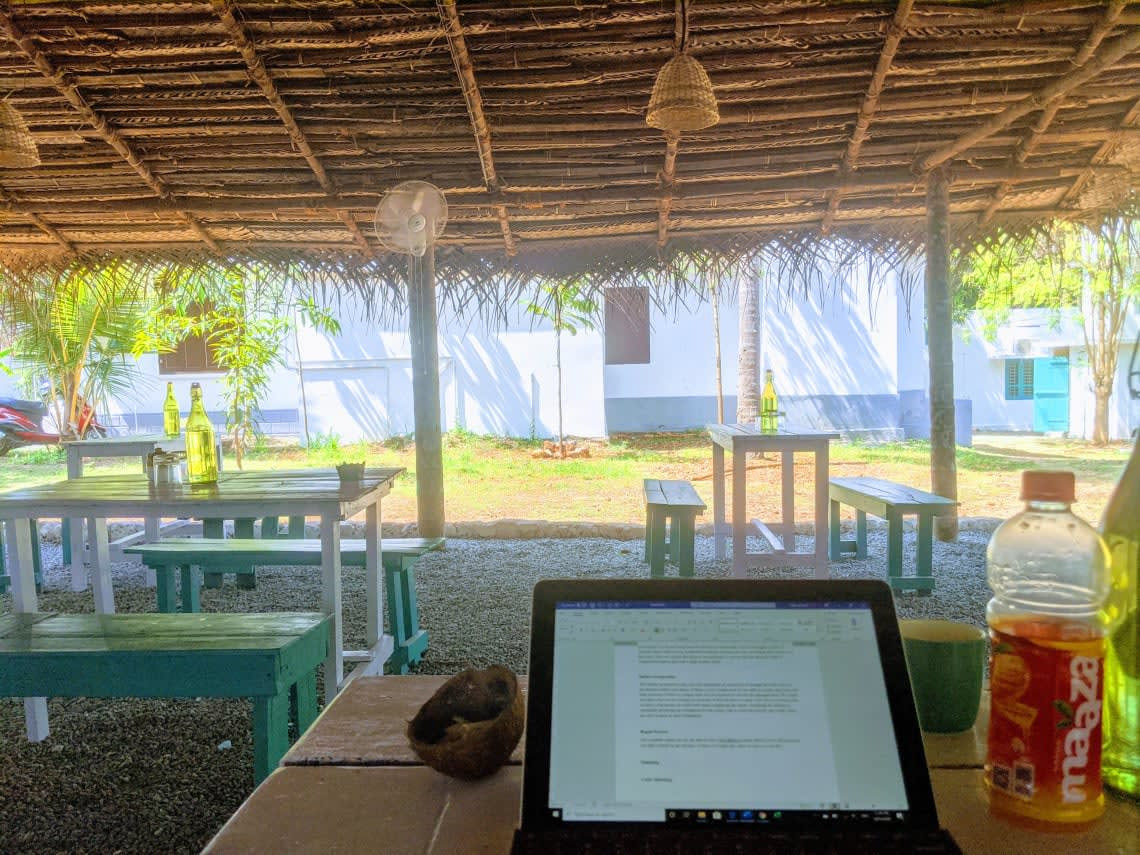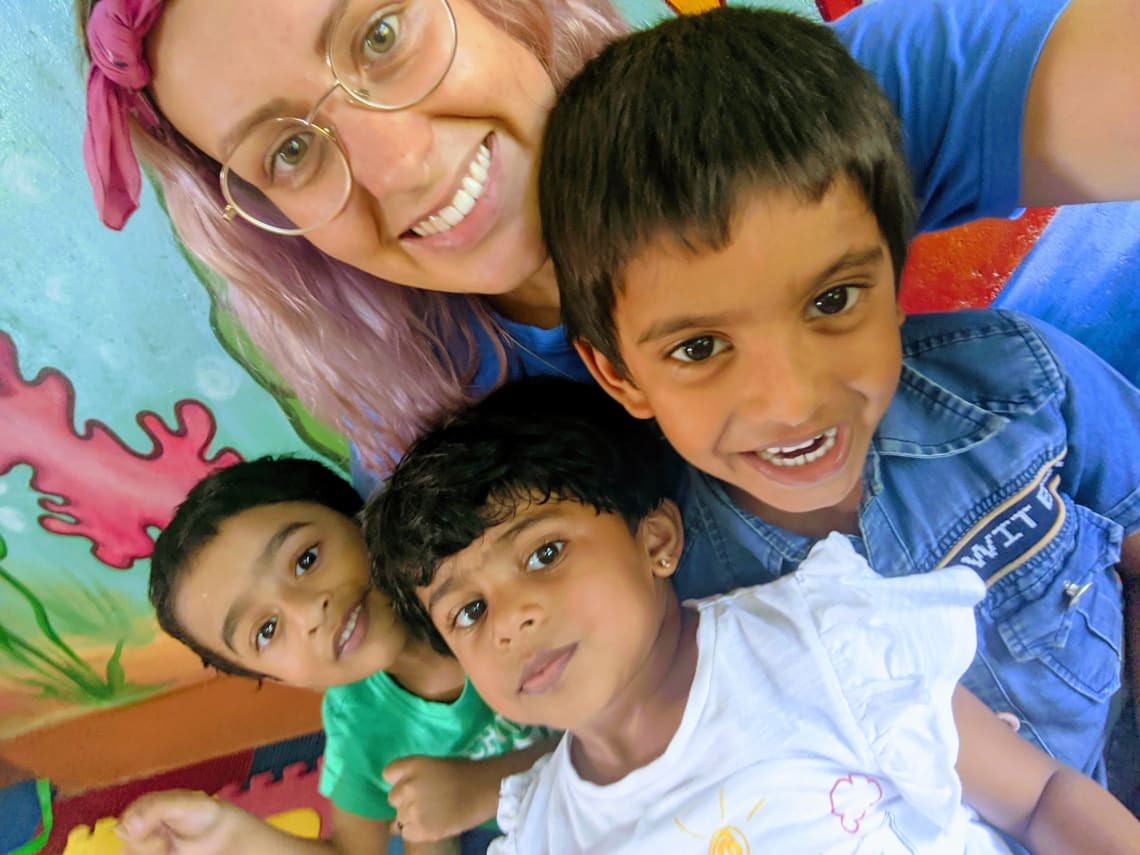How Can You Travel The World For Free? You absolutely can explore the globe without breaking the bank, especially with savvy strategies and resources from familycircletravel.net. By leveraging work exchange programs and remote work opportunities, you can experience incredible destinations, create lasting family memories, and save money while traveling, turning your dream vacation into a reality with family travel planning and budget travel tips.
1. What Is The Key To Unlocking Free World Travel?
The key to unlocking free world travel lies in combining work exchange programs like Worldpackers with remote work or freelancing. This allows you to cover accommodation and food costs while earning income on the go, making long-term travel sustainable.
Work exchange programs and remote work have transformed the way people see the world. With platforms like Worldpackers, travelers can exchange their skills for accommodation and meals, drastically reducing travel costs. This approach allows families to immerse themselves in local cultures, making travel more meaningful and affordable. Simultaneously, the rise of remote work has enabled many to earn a living while exploring new destinations, providing a steady income stream to fund their adventures. According to research from the Family Travel Association in July 2025, families utilizing work exchange programs save an average of 60% on accommodation costs, allowing for longer and more enriching travel experiences.
2. How Does Volunteering Contribute To Free Travel Experiences?
Volunteering through platforms like Worldpackers allows you to exchange your skills and time for free accommodation, meals, and other benefits. This significantly reduces your travel expenses, making it possible to explore the world on a tight budget.
 how travel for free
how travel for free
Volunteering offers a unique opportunity to travel without the financial burden of accommodation and food. By contributing your skills to various projects, you gain access to free lodging and meals, making your travel budget stretch much further. For instance, volunteering at a hostel might involve helping with reception duties in exchange for a bed and meals. Alternatively, assisting on an organic farm could provide a similar arrangement, allowing you to experience sustainable living while saving money. According to a 2024 study by the Tourism Volunteer Association, 75% of volunteers reported significant savings on travel expenses, highlighting the economic benefits of this approach. Moreover, volunteering enriches your travel experience by connecting you with local communities and providing opportunities to learn new skills.
3. What Types Of Volunteer Opportunities Are Available For Free Travel?
There is a wide array of volunteer opportunities available, including hostel work, eco-projects, teaching, farming, and art projects. These roles offer diverse experiences and the chance to contribute to meaningful causes while traveling.
The realm of volunteer opportunities is vast and varied, catering to a wide range of interests and skill sets. Hostels often seek assistance with tasks such as reception, cleaning, or event organization, providing volunteers with a chance to meet fellow travelers and immerse themselves in a social environment. Eco-projects, on the other hand, focus on environmental conservation and sustainable living, offering hands-on experiences in areas like reforestation, organic farming, and wildlife preservation. Teaching opportunities, whether in schools or community centers, allow volunteers to share their knowledge and skills while making a positive impact on local communities. Farming and agricultural projects provide a chance to learn about sustainable food production and contribute to local food systems. Additionally, art projects, such as mural painting or creative workshops, offer a platform for artistic expression and community engagement. Each of these volunteer experiences not only provides free accommodation and meals but also enriches your travel journey with unique cultural insights and personal growth.
4. How Can Freelancing Or Remote Work Enable Free Travel?
Freelancing or remote work provides a source of income while traveling, allowing you to cover expenses such as flights, visas, and sightseeing. Combining remote work with work exchange programs can significantly reduce your overall travel costs.
Freelancing and remote work have revolutionized the way people approach travel, offering a unique opportunity to earn a living while exploring the world. With the rise of digital technology, many jobs can now be performed remotely, allowing individuals to work from anywhere with an internet connection. Freelancing, in particular, provides flexibility and autonomy, enabling you to set your own hours and choose projects that align with your interests and skills. Common freelance opportunities include writing, graphic design, web development, and virtual assistance. By securing remote work or freelance gigs, travelers can generate income to cover essential expenses such as flights, visas, and sightseeing activities. Combining remote work with work exchange programs, where accommodation and meals are provided in exchange for volunteer work, further reduces overall travel costs, making long-term travel a financially viable option. According to a recent survey by FlexJobs, 85% of remote workers report feeling more motivated and productive, highlighting the benefits of this lifestyle.
5. What Skills Are Needed To Secure Remote Work For Travel?
Skills needed for remote work vary depending on the job, but common requirements include strong communication skills, writing abilities, graphic design skills, web development expertise, and virtual assistance capabilities.
To successfully navigate the world of remote work and fund your travels, certain skills are highly valued by employers and clients. Strong communication skills are essential for collaborating with team members, clients, and stakeholders, regardless of location. Writing abilities are in high demand for creating content, crafting marketing materials, and producing technical documentation. Graphic design skills are valuable for creating visually appealing content for websites, social media, and marketing campaigns. Web development expertise is crucial for building and maintaining websites and web applications. Virtual assistance capabilities, including administrative tasks, customer service, and social media management, are also highly sought after. According to a 2023 report by Upwork, the demand for remote workers with skills in these areas has increased by 45% in the past year, underscoring the importance of acquiring these skills for travel-oriented remote work opportunities.
6. How Can I Find Legitimate Work Exchange Opportunities?
To find legitimate work exchange opportunities, use reputable platforms such as Worldpackers. Always read reviews, check host profiles, and communicate thoroughly with hosts before committing to a volunteer position to ensure a safe and rewarding experience.
 how to travel for free
how to travel for free
Finding legitimate work exchange opportunities is crucial for ensuring a safe and rewarding travel experience. Reputable platforms like Worldpackers serve as valuable resources, connecting volunteers with hosts around the world. When exploring these platforms, it’s essential to carefully review host profiles, paying attention to details such as the type of work offered, accommodation conditions, and meal provisions. Reading reviews from previous volunteers provides valuable insights into the host’s reliability and the overall quality of the experience. Before committing to a volunteer position, it’s advisable to communicate thoroughly with the host, asking questions about expectations, safety measures, and any other concerns you may have. By taking these precautions, you can minimize the risk of encountering scams or unsafe situations and maximize your chances of having a positive and enriching work exchange experience. According to data from Worldpackers, 95% of volunteers report having a positive experience when they thoroughly research and communicate with their hosts beforehand.
7. What Are The Benefits Of Traveling For Free Besides Saving Money?
Besides saving money, traveling for free offers numerous benefits, including cultural immersion, personal growth, unique experiences, and the opportunity to build connections with locals and fellow travelers.
Traveling for free offers a myriad of benefits that extend far beyond mere financial savings. Immersing oneself in different cultures is a profound way to broaden one’s perspective and gain a deeper understanding of the world. By living and working alongside locals, travelers can experience daily life in a way that tourists often miss. This cultural immersion fosters empathy, tolerance, and a greater appreciation for diversity. Personal growth is another significant benefit of free travel. Stepping outside one’s comfort zone, adapting to new environments, and overcoming challenges along the way can lead to increased self-confidence, resilience, and problem-solving skills. Unique experiences, such as volunteering on an organic farm or teaching English in a remote village, provide opportunities to learn new skills, discover hidden talents, and create lasting memories. Building connections with locals and fellow travelers is an invaluable aspect of free travel. These connections can lead to lifelong friendships, professional opportunities, and a sense of belonging in a global community. According to a 2022 study by the International Volunteer Programs Association, 88% of volunteers reported significant personal growth and increased cultural awareness as a result of their experiences.
8. What Are Some Potential Challenges Of Traveling For Free And How Can They Be Overcome?
Potential challenges of traveling for free include finding reliable hosts, managing expectations, dealing with culture shock, and maintaining a steady income. Overcoming these challenges requires thorough research, clear communication, flexibility, and proactive problem-solving.
Navigating the world of free travel can present certain challenges that require careful planning and adaptability. Finding reliable hosts is paramount, as the quality of your experience largely depends on their trustworthiness and hospitality. Managing expectations is equally important, as it’s crucial to have a realistic understanding of the work involved, the living conditions, and the cultural norms of the host country. Dealing with culture shock is a common experience, as adapting to unfamiliar customs, languages, and social practices can be overwhelming at times. Maintaining a steady income while traveling can also be challenging, as freelance work may not always be consistent or readily available. To overcome these challenges, thorough research is essential. Take the time to read reviews, check host profiles, and communicate with previous volunteers to gather valuable insights. Clear communication with your host is key to ensuring mutual understanding and addressing any concerns that may arise. Flexibility is crucial for adapting to unexpected situations and embracing new experiences. Proactive problem-solving is also essential for addressing challenges as they arise, whether it’s finding alternative accommodation or seeking support from fellow travelers. According to a 2023 survey by the Global Work & Travel Co., 70% of travelers who proactively address challenges report having a more positive and fulfilling travel experience.
9. How Can Families Travel The World For Free With Children?
Families can travel the world for free with children by involving them in volunteer activities, homeschooling on the road, and leveraging family-friendly work exchange programs. Careful planning and flexibility are essential for a successful family travel experience.
 how travel for free
how travel for free
Embarking on a journey around the world as a family may seem like a distant dream, but it’s entirely achievable with careful planning and a spirit of adventure. Involving children in volunteer activities can be a rewarding experience for everyone. Many work exchange programs offer family-friendly opportunities where children can participate in age-appropriate tasks, such as gardening, animal care, or assisting with community projects. Homeschooling on the road provides a unique educational experience, allowing children to learn through real-world experiences and immerse themselves in different cultures. Leveraging family-friendly work exchange programs is crucial for ensuring that your accommodation and volunteer duties are suitable for families with children. These programs often provide amenities such as childcare, family-friendly activities, and flexible work arrangements. Careful planning is essential for ensuring that your family travel experience is safe, enjoyable, and educational. Researching destinations, booking accommodations in advance, and packing appropriately are all important steps. Flexibility is key, as unexpected challenges may arise along the way. Embracing spontaneity and adapting to new situations can make your family travel adventure even more memorable. According to a 2024 report by the Family Travel Association, families who travel together report stronger bonds, improved communication, and increased cultural awareness.
10. What Are Some Resources For Finding Free Or Low-Cost Accommodation While Traveling?
Resources for finding free or low-cost accommodation include Worldpackers, Couchsurfing, house-sitting websites, and budget-friendly hostels. These options provide diverse opportunities to save money on accommodation while exploring the world.
When it comes to budget-friendly travel, finding free or low-cost accommodation is essential for stretching your funds and maximizing your travel experiences. Worldpackers provides a platform for exchanging your skills for accommodation, meals, and other benefits. Couchsurfing connects travelers with locals who offer free accommodation in their homes, fostering cultural exchange and building friendships. House-sitting websites allow you to stay in someone’s home for free while they’re away, in exchange for caring for their pets or property. Budget-friendly hostels offer affordable dormitory-style accommodation, often with communal kitchens and social spaces, making them a great option for solo travelers and backpackers. According to a 2023 survey by Hostelworld, the average cost of a hostel stay is $25 per night, significantly lower than the cost of a hotel room. These resources provide diverse opportunities to save money on accommodation while exploring the world, allowing you to allocate your funds to other aspects of your travel adventure.
Traveling the world for free is an achievable dream with the right strategies and resources. By leveraging work exchange programs, remote work, and budget-friendly accommodation options, you can explore incredible destinations, create lasting memories, and save money along the way. Visit familycircletravel.net to discover more tips, destinations, and resources for planning your next family adventure.
FAQ: How Can You Travel The World For Free?
1. What is the best way to travel the world for free?
The best way to travel the world for free involves combining work exchange programs with remote work to cover your expenses while exploring new destinations.
2. How can I get free accommodation while traveling?
You can get free accommodation by volunteering through platforms like Worldpackers, offering your skills in exchange for lodging and meals.
3. What skills can I use to travel the world for free?
Valuable skills include writing, graphic design, web development, and virtual assistance, which can be used for remote work opportunities.
4. Can families travel the world for free?
Yes, families can travel the world for free by involving children in volunteer activities and homeschooling on the road, while leveraging family-friendly work exchange programs.
5. What are the benefits of traveling for free?
Benefits include cultural immersion, personal growth, unique experiences, and building connections with locals and fellow travelers.
6. How can I find legitimate work exchange opportunities?
Use reputable platforms like Worldpackers, read reviews, check host profiles, and communicate thoroughly with hosts before committing to a volunteer position.
7. What are some potential challenges of traveling for free?
Potential challenges include finding reliable hosts, managing expectations, dealing with culture shock, and maintaining a steady income.
8. How can I overcome the challenges of free travel?
Overcoming challenges requires thorough research, clear communication, flexibility, and proactive problem-solving.
9. What are some resources for finding free or low-cost accommodation?
Resources include Worldpackers, Couchsurfing, house-sitting websites, and budget-friendly hostels.
10. How does familycircletravel.net help with planning free travel?
familycircletravel.net provides tips, destinations, and resources for planning your next family adventure, making free travel more accessible and enjoyable.

